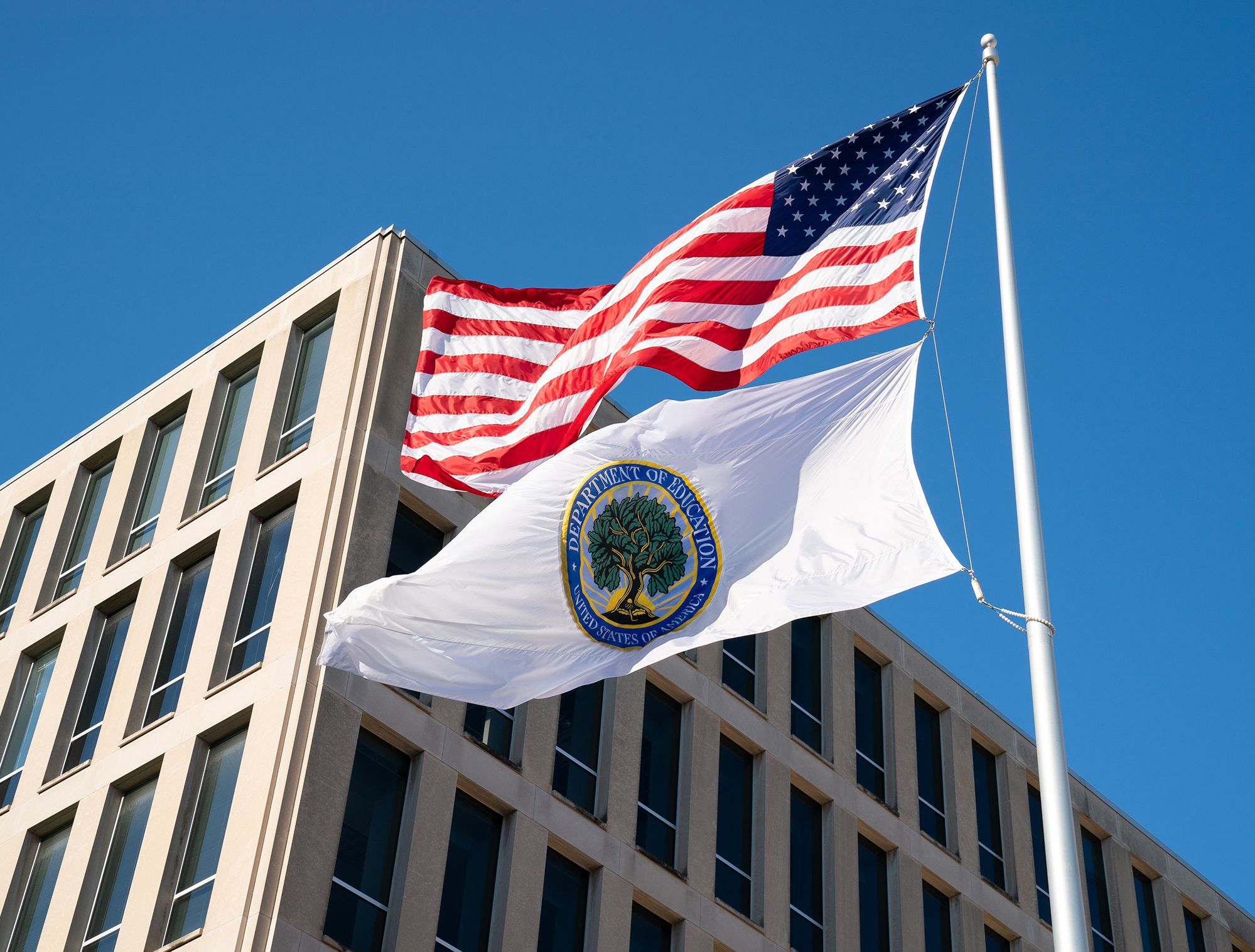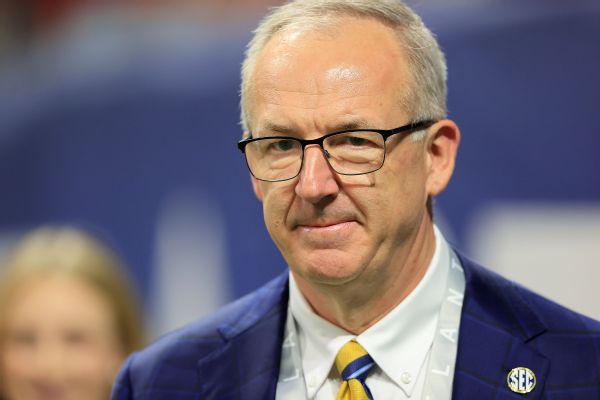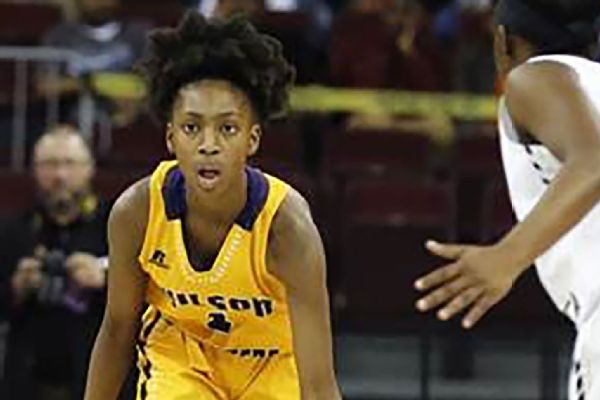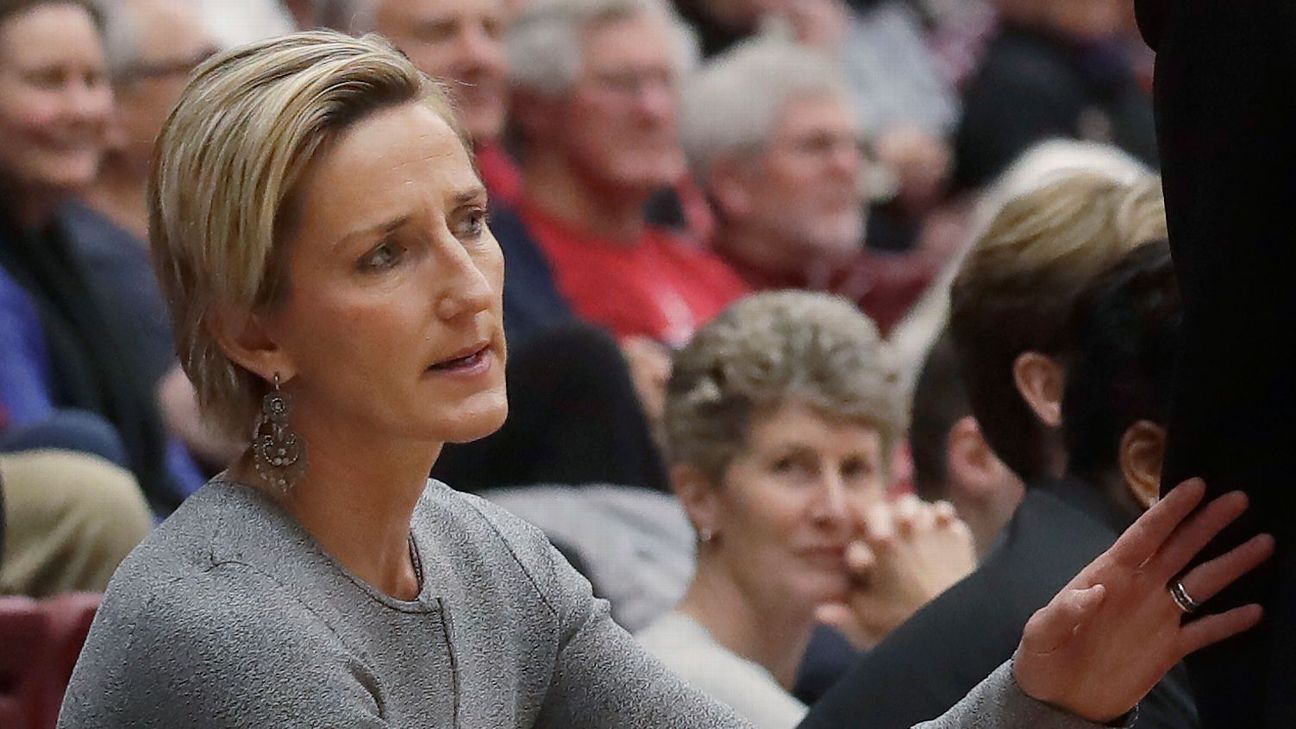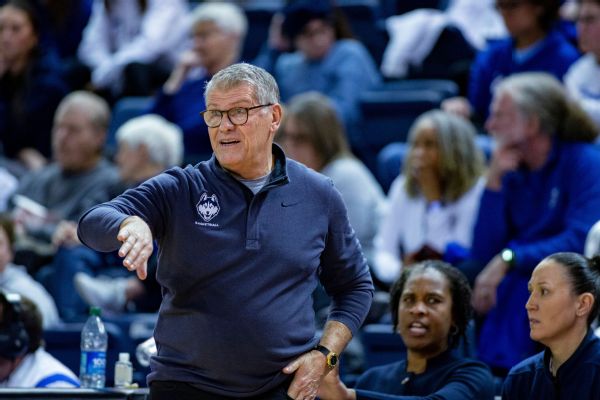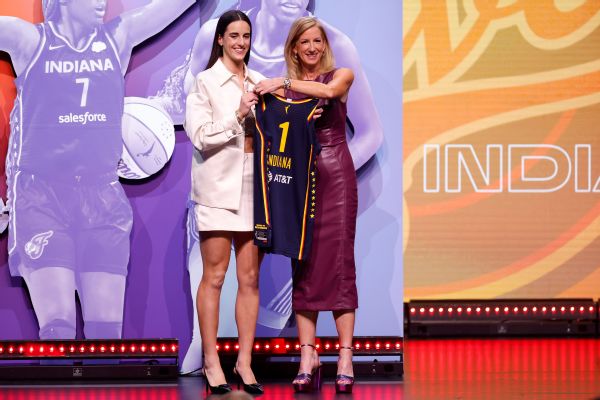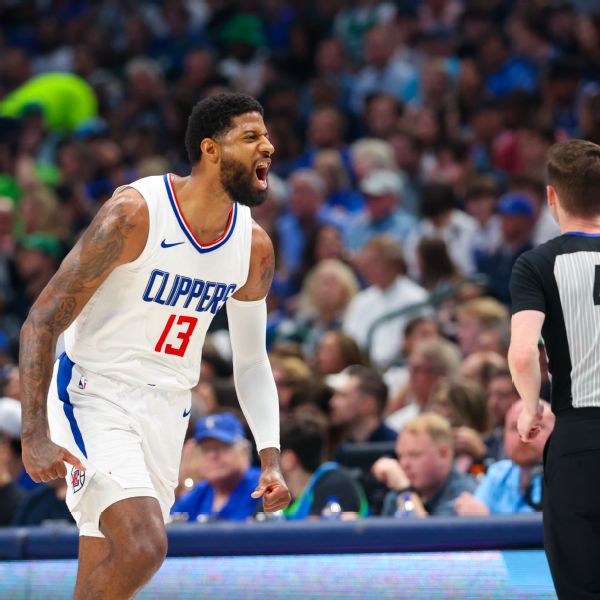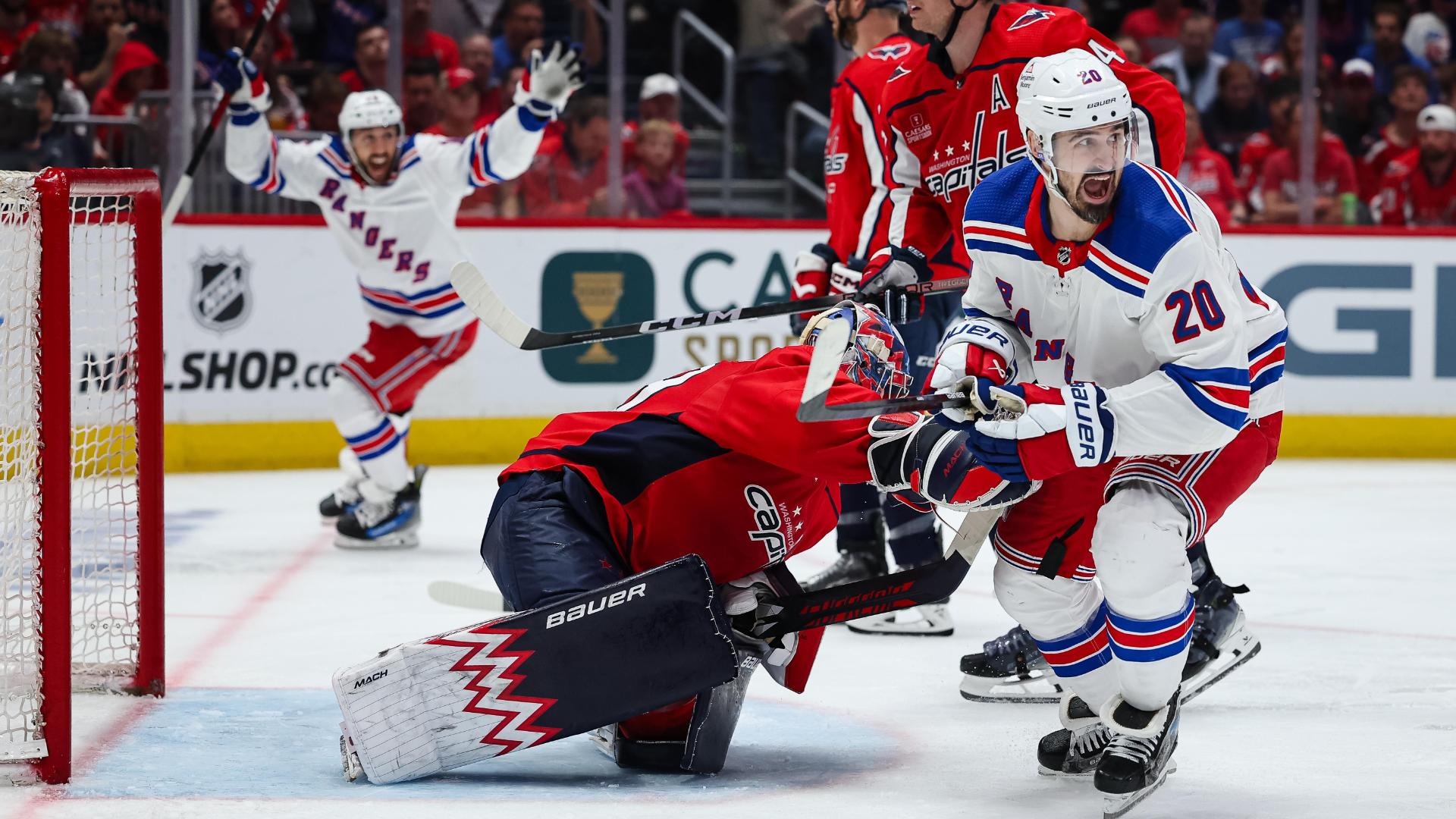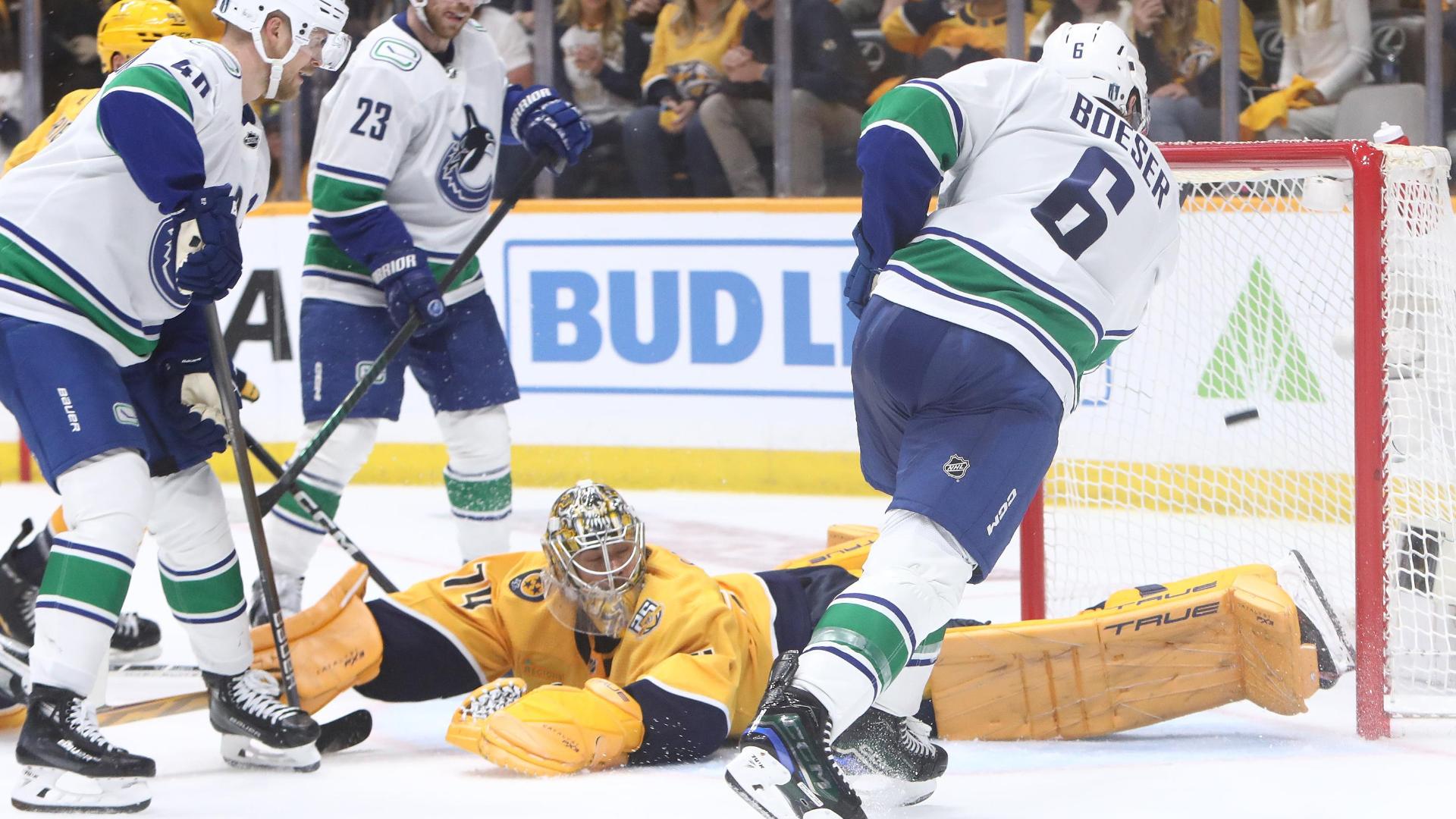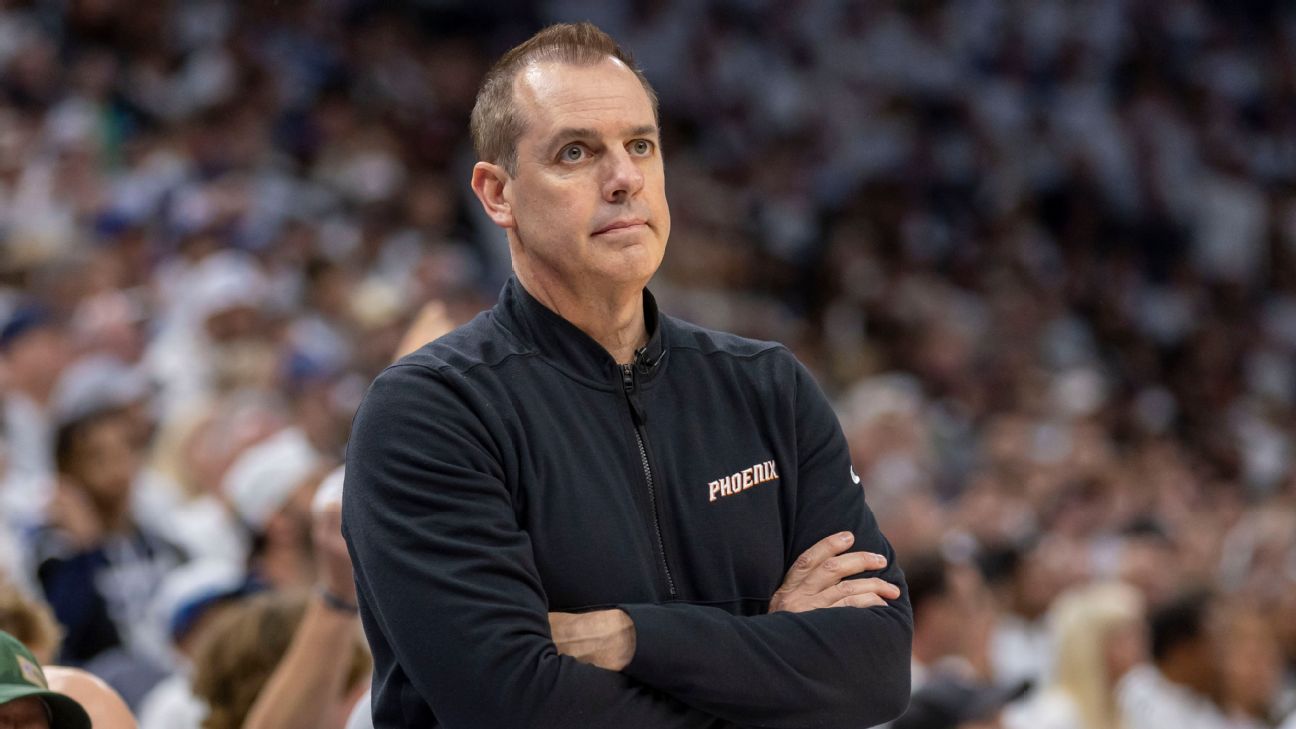![The coaches who will define the next decade in college football [608x342]](https://a.espncdn.com/photo/2024/0407/ncf_coaches_608x342.png)
Rangers finish off sweep of the Capitals move on to the 2nd round of the NHL playoffs
Nick Saban, likely the greatest coach in college football history, retired. Jim Harbaugh, the reigning national champion, left for the NFL again. All we needed was for one of those "Atlanta Falcons to offer Kirby Smart a jillion dollars a year!" rumors -- or Lane Kiffin's pleas on the topic -- to turn out true, and we'd have gotten a complete restart in the balance of power in college football coaching.
Smart is still at Georgia, but 2024 will still see a pretty big reset. And college coaching is quickly becoming a younger man's game. Only one of the projected top 15 teams in the winter SP+ rankings has a coach older than 53 years old (LSU's Brian Kelly is 62), while three are led by someone 40 or younger. Considering Saban was 52 when he won his first of seven national titles, this all says something pretty clear: The coaches who rule the sport in the coming years might do so for a while.
Who is potentially poised to take over college football? Some names are pretty obvious, but others aren't as easy to spot. So let's break things into categories and talk about 30 coaches who could rule college football through the 2020s and beyond.
Jump to a section: Already successful coaches Young stars | Deion | Group of 5 coaches Top assistants | The next DeBoers
Successful head coaches with plenty of tread left on the tiresThese coaches are all 50 or younger with a healthy number of wins, primarily at major schools (and mostly with at least one College Football Playoff bid), on their résumés. This is the cream of the crop.
1. Kirby Smart, Georgia Bulldogs. Smart probably belongs in a category to himself. He studied under Saban for 11 seasons before going off on his own, and unlike so many other former Saban assistants who couldn't live up to the master's standards, he is working on exceeding them. He was only 46 when he won his first title and 47 when he won his second, and in his past 48 games as a head coach, he has lost only to teams coached by Saban. The last active coach to beat him? Will Muschamp, a current Georgia defensive analyst, at South Carolina in 2019. That was nearly five years ago. He's the top dawg in this sport, and he will probably remain so for a while.
2. Kalen DeBoer, Alabama Crimson Tide. A three-time NAIA national champion by the age of 35, DeBoer left alma mater Sioux Falls in 2010 to climb the coaching ladder, first as an offensive coordinator at Southern Illinois, Eastern Michigan, Fresno State and Indiana, then as a head coach at Fresno State, where he engineered a 10-win season in Year 2, and Washington, where he went 25-3 and reached the national title game in his second season in Seattle. That's a pretty stunning résumé for anyone, much less someone who won't turn 50 for another six months. He's just coming into his prime as a head coach, and it will be fascinating to watch him deal with the immense expectations of the post-Saban Bama job.
3. Steve Sarkisian, Texas Longhorns. Sarkisan has already seen quite a few career arcs for someone who hasn't yet crossed the Saban's first-title age threshold yet. He was a prolific quarterback for coach LaVell Edwards at BYU and a well-regarded QBs coach and offensive coordinator for USC's Pete Carroll before pulling off a solid turnaround job as Washington head coach. Things went off course when Sarkisian was fired by USC in 2015 for his behavior while under the influence of alcohol and pain-killers, but he rebuilt his career, first as an offensive coordinator and then as Texas' head coach. He led the Longhorns to 12 wins and a CFP berth last season, and he will likely start 2024 with another top-five team.
4. Ryan Day, Ohio State Buckeyes. Losing three straight times to Michigan will age a man, but Day is only 45, and his career skyrocketed over the past decade. In a short time, he went from Steve Addazio's offensive coordinator at Boston College to, after two years as an NFL quarterbacks coach, Urban Meyer's offensive co-coordinator and eventual successor at Ohio State. And even with the aforementioned Michigan losses, he's 56-8 after five years with three CFP appearances and five top-10 finishes. He'll enter 2024 with maybe the best defense in the sport (he had the best offense, per SP+, in 2021) and has a massive opportunity to again surpass those dreaded Wolverines.
5. Lane Kiffin, Ole Miss Rebels. He has not yet reached the CFP as a head coach, but Kiffin's résumé sneaks up on you. At age 48, he has already been a college or pro head coach for parts of 14 seasons, and he has won double-digit games five times. After a rather noteworthy failure, he picked up the pieces by modernizing Saban's offense at Alabama, then winning two conference titles at FAU. A modern roster builder in every possible way ( translation: He uses the transfer portal heavily), Kiffin has led Ole Miss to two of its three best poll finishes in the past 54 years.
6. Luke Fickell, Wisconsin Badgers. As an Ohio State assistant (and, for one ill-fated season, its interim coach), Fickell served as a bridge between the Jim Tressel and Urban Meyer eras, but he didn't get his first head coaching gig until he was 43. After a major first-year reset in 2017, Fickell's Bearcats improved for four straight seasons, going 44-7 and eventually reaching the 2021 CFP (where they fared much better against Alabama than Harbaugh's Michigan fared against Georgia). Fickell just went through a first-year reset at Wisconsin, too, and while there's no guarantee of a Cincinnati-esque rise, Fickell has earned the benefit of the doubt.
Honorable mention: Matt Campbell, Iowa State; Mike Elko, Texas A&M; Jedd Fisch, Washington; Josh Heupel, Tennessee; Jonathan Smith, Michigan State.
Most exciting younger head coachesNever mind the 50-and-under crowd. These 42-and-unders have all accomplished as much or more than the six guys above had by their age. At least a couple of the seven coaches here should become major coaching stars in the next decade.
7. Dan Lanning, Oregon Ducks. In a five-year span in the 2010s, Dan Lanning worked for Sam Houston's FCS title-winning K.C. Keeler, Saban, Mike Norvell and Smart. Lanning became Smart's defensive coordinator at age 32 and took the reins of a major program at 35. The growing pains have been minimal. Lanning is 22-5 at Oregon, and his 2023 Ducks were a nearly perfect team, going 12-2 and suffering only one allergy: slow starts against DeBoer's Washington. SP+ projects them to get even better in 2024. Lanning might be the brightest young star in the coaching profession.
8. Mike Norvell, Florida State Seminoles. At 42, Norvell already has nearly a decade of head-coaching success on his résumé. He won 38 games with an AAC title and two ranked finishes at Memphis, then took on a dire situation at FSU, where he improved the Seminoles from three, to five, to 10, to 13 wins. Per SP+, both the offense and defense have improved every year under Norvell's watch. His track record of adding stars through the transfer portal is as impressive as anyone's, and if they have the right quarterback, the Seminoles could be the ACC favorites again in 2024.
9. Marcus Freeman, Notre Dame Fighting Irish. After rising to prominence as Fickell's defensive coordinator at Cincinnati, Freeman actually jumped ahead of Fickell to snare the Notre Dame job in 2021 at age 35. He has dealt with some bumps (among other things, he's on his third offensive coordinator in three seasons) but has still won 19 games in two seasons, and his Fighting Irish finished 2023 smoking hot. Throw in heavy recruiting prowess -- an average signing class ranking of 9.3 and two straight huge quarterback transfer signings (first Sam Hartman, then Riley Leonard) -- and you have a coach with massive potential.
10. Eliah Drinkwitz, Missouri Tigers. Granted, the 40-year old Drinkwitz wouldn't have made this list a year ago, as he was coming off of a third straight .500-or-thereabouts season at Mizzou. But years of successful recruiting and a couple of fantastic coordinator hires paid off in 2023: The Tigers enjoyed an 11-win campaign, a Cotton Bowl win over Ohio State and their first top-10 finish in a decade. He lost defensive coordinator Blake Baker to LSU but returns a lot of 2023's difference-makers, and Mizzou will likely start 2024 as a top-15 team with hopes of an at-large bid in the first expanded CFP.
11. Lincoln Riley, USC Trojans. Has some of the shine come off the Riley rose now that his USC Trojans have gone just 8-7 in their past 15 games? Sure. He showed too much loyalty to an unsuccessful defensive coordinator and hasn't been able to build the defensive culture to match his offensive machine. But he has also won 74 games between seven years as a head coach at Oklahoma and USC, with six top-15 finishes, four conference titles, three Heisman-winning quarterbacks and three CFP bids, and he won't turn 41 until the fall. Almost no one produces a résumé that good, that young.
12. Sherrone Moore, Michigan Wolverines. The more responsibility you give Sherrone Moore, the better he does. The former Oklahoma offensive lineman went from Michigan tight ends coach to co-coordinator to coordinator to, briefly, acting head coach for a national title winner, and his profile grew at such a rate that he was almost a no-brainer replacement when Harbaugh left. The 38-year-old's trajectory is awfully Ryan Day-esque -- taking over briefly for his suspended boss, then taking the head coaching job -- and while his career record is technically just 1-0, Moore was a no-brainer for this list as well.
13. Rhett Lashlee, SMU Mustangs. Lashlee earned his first offensive coordinator gig at Samford, at just 27, and he was the OC when Auburn reached the national title game in 2013. After grinding away at a number of different coordinator gigs, Lashlee landed the SMU job in 2022, and his Mustangs have won 15 of their past 20 games and took the AAC title in 2023. Thanks to some transfer portal prowess and a brilliant defensive coordinator hire (Scott Symons), he'll lead SMU into the ACC with what sure looks like a major-conference roster.
Honorable mention: Fran Brown, Syracuse; Kenny Dillingham, Arizona State; Jeff Lebby, Mississippi State.
Coaches named Deion SandersIf we're talking about coaches who will define the sport in the coming years, it's hard to leave off the guy who turned a four-win season into a nonstop, headline-grabbing escapade in his first season as an FBS head coach.
14. Deion Sanders, Colorado Buffaloes. Whatever happens for the 56-year-old Sanders moving forward, good or bad, it will be news. Sanders attempted an almost total roster flip in 2023, signing more than 50 transfers in the process. But after a bright, 3-0 start, the Buffaloes crashed and burned, losing eight of their last nine. Still, (A) going 4-8 and ranking 81st in SP+ still qualified as significant improvement, and (B) Sanders also has massive success at Jackson State (23-3 in 2021-22) on his résumé. And hey, does The Rock come to your team's home games?
Most exciting younger head coaches (Group of 5 edition)For the most part, the 14 names above are well known and mostly well proven. Now it's time to make some educated guesses. Who are the coaches most likely to make big, disruptive splashes at the next level ... once they get there? Let's look at coaches working up the ranks at the Group of 5, assistant coach and smaller-school levels.
First up: the mid-major studs.
15. Jon Sumrall, Tulane Green Wave. It seems to take defensive coaches a bit longer to work their way up the ladder, but Sumrall was still Tulane's defensive co-coordinator by age 29, and when he landed the Troy head-coaching job at 39, he made the most of it. He took a Trojans team that had gone 15-20 over three years and went 23-4 in two and won back-to-back titles in an improving Sun Belt. Now he heads back to Tulane to succeed Willie Fritz. It was one of the most logical and high-upside hires of the offseason.
16. Sean Lewis, San Diego State Aztecs. After a season spent on the Colorado roller coaster with Sanders, Lewis took his second head-coaching gig. He proved a lot in the first. Kent State went 14-45 in the five years before his tenure there and went 1-11 after he left; that he was able to go 22-21 there over four seasons (2019-22) was a mini miracle. Lewis' Golden Flashes ranked in the offensive SP+ top 50 twice, and now, still only 37 years old, he takes over an SDSU program that, for all of its defensive prowess, has fielded one top-50 offense in 10 years.
17. Ryan Silverfield, Memphis Tigers. It took a little while for the 43-year-old Silverfield to make the Memphis job his own after succeeding Norvell in 2020. He went a decent but not great 21-15 in his first three seasons. As with Drinkwitz, steady recruiting successes and good portal work paid off in 2023. His Tigers went 10-3 with tight losses to Drinkwitz's Mizzou and Lashlee's SMU, and he heads into 2024 with a proven quarterback (Seth Henigan, who stayed at Memphis despite transfer overtures) and maybe the favorite to snare the Group of 5's CFP bid. His stock could rise quickly.
18. Alex Golesh, South Florida Bulls. Born in Moscow -- the Russian one, not the Idahoan one -- Golesh began his coaching career at the high school level at 19. After coaching for the diverse duo of Matt Campbell and Josh Heupel, he landed his first head-coaching job last year at age 38 and immediately crushed it. After going a combined 4-29 from 2020 to 2022, USF leaped to 7-6 last season, scaring Alabama and Memphis and crushing Syracuse 45-0 in the Boca Raton Bowl. His track record isn't extensive, so putting him here is a risk, but what a first impression he made.
Honorable mention: Bob Chesney, James Madison; GJ Kinne, Texas State; Eric Morris, North Texas; Scotty Walden, UTEP.
Rising young assistantsFrom coaches with minimal head-coaching track records, we now move to the guys with none.
19. Glenn Schumann, Georgia defensive coordinator. If you were to create a future college football coaching overlord in a lab, you might end up with Glenn Schumann's back story. Schumann attended Alabama, seemingly with the sole purpose of landing a student-assistant job under Saban. Once he graduated, he quickly became Saban's director of football operations, and he had become Kirby Smart's inside linebackers coach at Georgia before his 26th birthday. Now he's the defensive coordinator. He's not yet 35, and one assumes he'll have his pick of major head-coaching jobs in the very near future.
20. Will Stein, Oregon offensive coordinator. A former Louisville quarterback, the 34-year-old Stein landed on Jeff Traylor's coaching staff in 2020 and played a major role for offenses that ranked 31st and 30th, respectively, in offensive SP+ in 2021-22. That attracted Lanning's attention, and Stein replaced Kenny Dillingham as Oregon's OC last fall. The Ducks jumped from eighth to first in offensive SP+ in his debut season, matching extreme efficiency and turnover avoidance with big-play capabilities. He helped turn quarterback Bo Nix into a surefire first-round pick, and now he gets to coach Oklahoma transfer quarterback Dillon Gabriel for a season.
21. Alex Atkins, Florida State offensive coordinator. In his lone year as Charlotte's offensive coordinator in 2019, the 49ers leaped from 124th to 84th in offensive SP+. In his first season as FSU's OC in 2022, the Noles went from 70th to 36th. They finished 2023 at 23rd, too, despite the late-year struggles associated with Jordan Travis' injury. He's not a solo playcaller in Tallahassee -- he splits those duties with Norvell -- but while it's often easy to overlook O-line coaches when thinking about up-and-comers, it's impossible to do so with Atkins.
22. Andy Kotelnicki, Penn State Nittany Lions offensive coordinator. As Lance Leipold's longtime right-hand man, Kotelnicki jumped with Leipold from Wisconsin-Whitewater to Buffalo and fielded two top-40 offenses with the Bulls. Then he went with Leipold to Kansas and, after a single-year breaking-in period, fielded two top-30 offenses despite QB injuries. Now he leaves Leipold to see if he can both score big on his own and give a push to a PSU offense that has been a weak link of late. Succeed, and like quite a few recent James Franklin assistants, he'll get a pretty big job soon after.
23. Zac Alley, Oklahoma Sooners defensive co-coordinator. A graduate assistant with Brent Venables at Clemson, Alley went off on his own, becoming the youngest FBS coordinator at 27 with Louisiana-Monroe. In Monroe, he linked up with Rich Rodriguez and followed him to Jacksonville State, where he fielded a shockingly effective defense in 2023: The Gamecocks were 57th in defensive SP+ in their first FBS season. Now, at 30, he's back with Venables in Norman, and he inherits an experienced unit that has underachieved. Turn the Sooners' D around, and he'll have his pick of big jobs.
24. Collin Klein, Texas A&M Aggies offensive coordinator. Like Kotelnicki, Klein is betting on himself, leaving a comfortable situation with Chris Klieman at his alma mater to succeed in a new environment. After two great years as Kansas State's OC -- the Wildcats were seventh in offensive SP+ last season, their best ranking since 2012, when Klein was the QB -- he now inherits quarterback Conner Weigman and the blue-chippers at Texas A&M. If he can give the Aggies their first top-15 offense since the Johnny Manziel years, he'll be both coaching in the CFP and fielding lots of calls.
25. Al Washington, Notre Dame defensive line coach. A decade ago, Dan Lanning was the defensive backs coach at Sam Houston, so we need to save a couple of spots on this list for position coaches. A former star defensive tackle at Boston College, the 39-year-old Washington has coached at Michigan, Ohio State and Notre Dame, and he has ranked seventh in 247Sports' football recruiter rankings twice in the past three years. He nearly landed the head-coaching job at his alma mater this offseason, and his influences suggest that when he does get a top job, he'll know what to do with it.
26. Marcus Davis, Auburn Tigers receivers coach. He caught 23 passes as a freshman on Auburn's runner-up 2013 team, and his coaching career didn't even start until 2018. He is young. So why is he on this list? Because (A) becoming an SEC position coach before age 30 is likely a solid predictor of future coaching success, and (B) he was sixth in 247's football recruiter rankings in this past class, responsible for Auburn's incredible receiver haul. If we're looking for coaches at the start of a long and positive career trajectory over the next decade, it seems like those credentials are a good place to start.
Honorable mention: Ben Arbuckle, Washington offensive coordinator; Steve Belichick, Washington defensive coordinator; Kirk Campbell, Michigan offensive coordinator; Liam Coen, Kentucky offensive coordinator; Wes Goodwin, Clemson defensive coordinator; Brian Hartline, Ohio State offensive co-coordinator; Mack Leftwich, Texas State offensive coordinator; Garrett Riley, Clemson offensive coordinator; Elijah Robinson, Syracuse defensive coordinator; Tray Scott, Georgia defensive line coach.
The next DeBoersThe second-best coach in college football was an NAIA coach until age 34 and didn't become a power-conference head coach until age 47. You never know where an awesome career is going to start or when a big break is going to come. So let's save some space on this list for coaches who are absolutely wrecking shop at one of the sport's lower levels.
Thanks to both retirements (like that of South Dakota State's John Stiegelmeier and Mary Hardin-Baylor's Pete Fredenburg) and recent moves up the ladder for some successful small-schoolers, we're seeing a bit of turnover in the balance of power at the lower levels. But there's still dominance to be celebrated.
27. Paul Simmons, Harding Bisons. Simmons is a modern-day Erk Russell. Russell spent nearly two decades as Georgia's defensive coordinator before riding option football and nasty defense to three FCS national titles at Georgia Southern. Simmons has spent almost 30 years at Harding, where he played and served as DC before taking over in 2017 and taking the Bisons to a new level with, yes, option football and nasty defense. In 2023, Harding won 11 regular-season games by an average of 52-9, beat two top-six teams in the early rounds of the Division II playoffs and then smoked top-ranked Colorado Mines to win the national title. Harding football is honest and devastating, and Simmons is about the age Leipold was when he jumped up from Division III.
28. Jimmy Rogers, South Dakota State Jackrabbits. From a seasoned veteran, we go to a guy just getting his head coaching start. Rogers theoretically had a pretty easy job when he took over from Stiegelmeier last year -- SDSU returned most of the difference-makers from 2022's national title team, after all. But the Jackrabbits improved in every way in 2023 and would have been a borderline top-25 team at the FBS level. They were an absolute wrecking ball. A former SDSU captain, Rogers is in only his mid-30s. He has room for growth, and he proved as much as possible in his first year as a head coach.
29. Curt Fitzpatrick, Cortland Red Dragons. I didn't intend to simply list national champions here, but here's a third straight. The 42-year-old Fitzpatrick forced his way onto this list, first by turning a bad SUNY Morrisville team good, then by turning a good SUNY Cortland team great. The Red Dragons averaged 7.5 wins per year in the decade before he arrived, but he's 34-4 in three seasons. They had won three total Division III playoff games since 2008 before winning five in a row last fall, upsetting North Central in the title game. Wherever Fitzpatrick goes, major improvement follows.
30. Joe Woodley, Grand View Vikings. It wouldn't be a next DeBoers list without an NAIA guy, right? While there are quite a few with similar credentials, and reigning national champ Doug Socha of Keiser University just took the job at Division II Lenoir-Rhyne, we'll go with McCarty. The former Iowa State captain helped his father, Mike, build the Grand View program from scratch and has gone an incredible 58-5 in five seasons since taking over. He hasn't snared a national title yet, but it's only a matter of time. He might know more about the program-building experience than anyone in college football, and he has a degree from an FBS school on his wall. Good combo.
Honorable mention: Geoff Dartt, Mount Union; Matt McCarty, Northwestern (Iowa); Chris Oliver, Georgetown (Kentucky); Brad Spencer, North Central; Pete Sterbick, Colorado Mines; Chris Winter, Wartburg.


